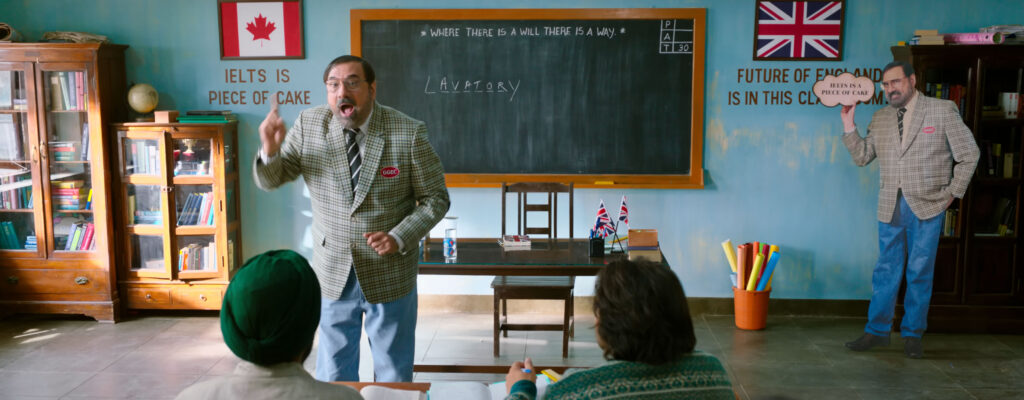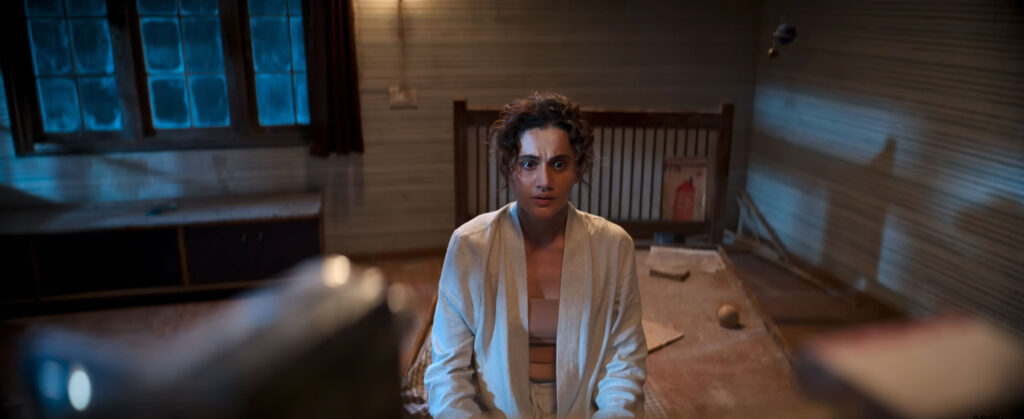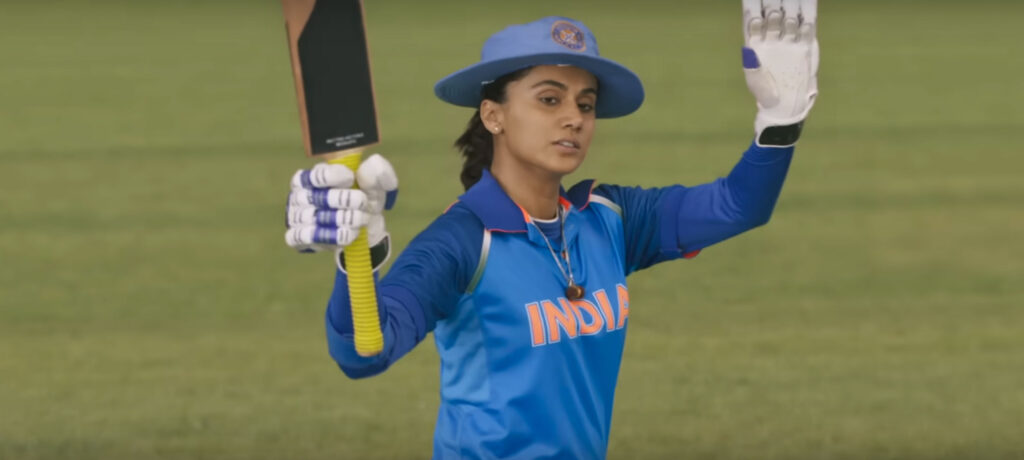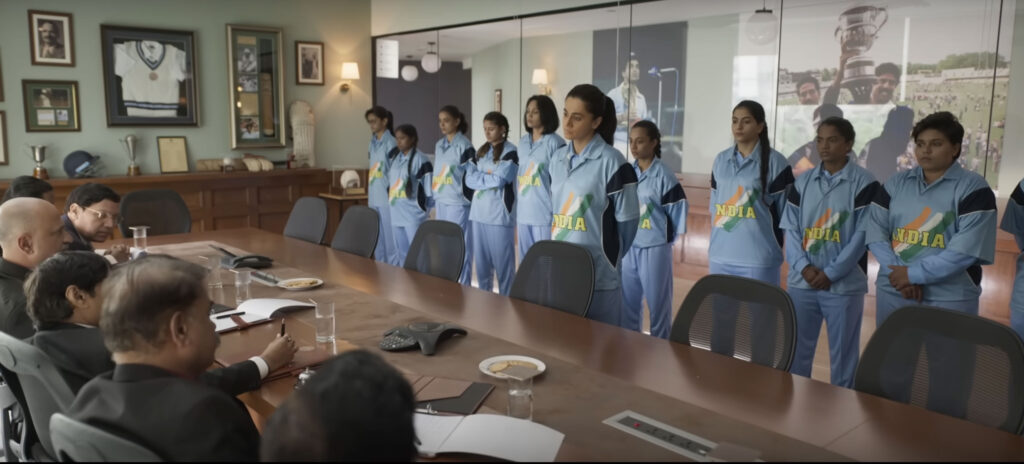January 7, 2024
by Carla Hay

Directed by Rajkumar Hirani
Hindi with subtitles
Culture Representation: Taking place from 1995 to 2020, in Asia and in Europe, the comedy/drama film “Dunki” features a predominantly Asian cast of characters (with some white people) representing the working-class, middle-class and wealthy.
Culture Clash: A group of friends from India have various experiences in their efforts to illegally immigrate to the United Kingdom.
Culture Audience: “Dunki” will appeal primarily to people who are fans the movie’s headliners and comedy/drama films that cover social issues in ways that are often awkward.

“Dunki” clumsily mixes absurdist comedy with preachy drama in making statements about the dangers of undocumented immigration. Every time a serious life-threatening situation is depicted, the movie then throws in silly jokes for some cheap laughs. These awkward tonal shifts dilute the movie’s intentions more often than not, although the cast members try hard to keep a balance in this erratic film.
Directed by Rajkumar Hirani, “Dunki” has a title that refers to India’s Punjab term “donkey flight,” which is a way to illegally immigrate to other countries—usually Western countries such as the United Kingdom, the United States, and Canada. Hirani co-wrote the “Dunki” screenplay with Abhijat Joshi and Kanika Dhillon. “Dunki,” whose story spans about 25 years, is about the shenanigans of a group of friends who go through various trials and tribulations as “dunki” immigrants who are desperate to move to London. None of the “Dunki” cast members gives a particularly impressive performance.
“Dunki” begins in 2020. Manu Randhawa (played by Taapsee Pannu), a woman in her 50s, is in a wheelchair at a London hospital. She bribes a hospital orderly to wheel her out of the hospital because she’s not supposed to be discharged from the hospital yet. As soon as Manu leaves the hospital, she gets out of the wheelchair and goes to the office of immigration attorney Puru Patel (played by Deven Bhojani), who knows her from interactions with her 25 years earlier in 1995.
Manu begs Puru to find a way to get a visa for her to go back to India (she’s a native of Punjab), but Puru says Manu is not allowed to go back to India. Puru tells Manu that Dubai is the nation closest to India where she can get a visa. Manu isn’t happy about these circumstances, but she accepts the visa to Dubai. It’s explained later in the movie why Manu was in a hospital and why she can’t go back to India.
When Manu is Puru’s office, she makes a phone call to Hardayal “Hardy” Singh Dhillon (played by Shah Rukh Khan), a man she fell in love with when she met him in 1995. Hardy is in Punjab, where he is in the middle of a foot race at a racing track when he gets the call from Manu. She jokingly refers to herself as Hardy’s wife and says she needs to tell him something important in person, but he has to meet her in Dubai, becase she can’t get a visa to go to India.
Hardy is curious and delighted to hear from Manu, so he agrees to Manu’s invitation to go to Dubai. Manu makes arrangements with Puru for her two longtime friends Balli Kakkad (played by Anil Grover) and Balindar “Buggu” Lakhanpal (played by Vikram Kochhar), who also live in London, to also get visas to Dubai, so that these two pals can accompany her on the trip. Balli and Buggu work together in a clothing shop called Punjab Tailors.
Before “Dunki” shows this trip toward the end of the movie, most of the film switches to a flashback to 1995. At the time, Manu, Balli and Buggu were all in their mid-20s, financially struggling, and yearning for a better life, which they believe they have a better chance of achieving in London. The problem is that their chances of being legally approved for a visa are very low because they are poor and uneducated.
Manu is an underappreciated cook and server at a local casual eatery, where her specialty is making parathas. She’s miserable in her job, mainly because her boss Bobby Dhaba (played by Piyush Raina) is an egotistical jerk. Balli is a barber who lacks confidence in a lot of areas in his life. Buggu is a sales clerk at a clothing shop, who is a “mama’s boy” at home. In the minds of all three friends, London is like a “promised land” where their dreams can be fulfilled.
Through a series of circumstances, the three friends end up in the office of Puru, who was based in India at the time. Puru is an attorney who uses shady business practices to exploit desperate people who want quick visas. He thinks up deceptive schemes for his clients to tell lies in order to get visas.
Puru says Balli can get a spouse visa by marrying a British citizen who’s a drug addict and willing to marry an immigrant stranger for money. Puru says Buggu can get a business visa, based on Buggu’s very limited business knowledge of working in retail. Puru says Manu can get a sports visa, even though she has no real athletic skills. Puru comes up with the idea to pretend that Manu is a track runner.
It just so happens that Manu meets Hardy around the same time she’s planning to get a visa under false pretenses. Hardy visits the home of Manu’s family, where she lives with her parents (played by Manoj Kant and Amardeep Jha) and other family members. Hardy has arrived in town because he was in combat with Manu’s older brother Mahinder (played by Suhail Zargar, shown in a flashback) and wants to return some items that belong to Mahinder.
However, Hardy is shocked and dismayed to find out that Mahinder died in a car accident and has left behind a widow and a son. Manu’s family has fallen on hard times in other ways. The family went into debt to a loan shark, who has now seized ownership of the family’s home.
The main reason why Manu wants to move to London is to make enough money to send back to her family so that they can buy back the family house. Manu tells Hardy all about this sob story, as well as the visa scheme to pretend that she’s a track runner. Hardy agrees to be her coach and then gets involved in the plans to immigrate to London with Manu, Balli and Buggu.
One of the more frustrating things about “Dunki” is that it’s a 161-minute movie that wastes a lot of screen time by cramming in a lot of subplots, some of which are abandoned for another distracting subplot. The subplot about Manu’s charade as an athlete is ditched for a fairly long stretch of the movie where Hardy, Manu, Balli and Buggu enroll in an English-language class, which is required for them to get their visas to the United Kingdom.
In this English-language class, they befriend a neurotic man named Sukhi (played by Vicky Kaushal), who wants to move to London to save his ex-girlfriend Jassi, who is married to an abusive man. The teacher of this English-language class is a pompous buffoon named Geetendar “Geetu” Gulati (played by Boman Irani), who treats his students in a very condescending manner. He also has contempt for his students, because he thinks that most of them are planning to do something illegal or dishonest to get visas.
The movie’s running joke for these classroom scenes is that Geetu is fixated on teaching the students how to say in English: “I want to use the lavatory.” This joke runs out of steam quickly, but it’s repeated to the point of annoyance in “Dunki.” However, a highlight of these classroom scenes is when Sukhi gives a very funny monologue to prove he’s learned a lot more English than Geetu thinks he has.
The sprawling and frequently disjointed story in “Dunki” shows the undocumented immigrant pals going to various countries in Asia and Europe in their quest to get to London. Along the way, a lot of dark and depressing things happen, such as suicide, murder, and the constant threat of being in violent danger during this journey. The movie also shows grim statistics and real news photos about deaths that can happen to people who immigrate to countries through illegal means.
“Dunki” is a very off-putting mess that goes back-and-forth between showing all of this harsh gloom and then switching to idiotic slapstick comedy in ridiculous scenarios. It diminishes the real-life immigrant suffering that the movie is trying to convey. At one point, the plight of refugees seeking asylum becomes a part of the story. And that’s when the movie really goes downhill and never recovers.
“Dunki” has lot of subtle and not-so-subtle preaching that visas are a form of class discrimination. However, this argument is very warped in the movie in how it tries to equate the living conditions that Hardy, Manu, Balli and Buggu want to leave in India to the living conditions of refugees who are fleeing their homelands because their lives are in danger. The fact of the matter is that Hardy, Manu, Balli and Buggu are not even close to being refugees who are fleeing from life-threatening danger in their homeland. The main motivation that Hardy, Manu, Balli and Buggu have to leave India and move to London is to make more money.
“Dunki” also wants to condemn the people who exploit desperate undocumented immigrants, but this condemnation is also mishandled by presenting all of these exploiters (such as a corrupt attorneys or human trafficking smugglers) as cartoonish characters. In “Dunki,” immigration officials are also caricatures, who are usually depicted as hateful bigots or completely incompetent. And ultimately, “Dunki” is insulting to the protagonists that the movie claims to be rooting for, by making these protagonists look very dimwitted.
The movie spends so much time not being able to make up its mind on whether to be a wacky misadventure or a cautionary tale, it treats the love story of Hardy and Manu almost like an afterthought. There isn’t much in “Dunki” to convince viewers that Hardy and Manu should be together, especially when they see each other in middle age and play immature and deceptive games with each other about their marital status. If you think that “Dunki” will be a clever satire of immigration problems, then look elsewhere, because “Dunki” is not that movie.
Yash Raj Films released “Dunki” in select U.S. cinemas on December 21, 2023, the same date that the movie was released in India.




